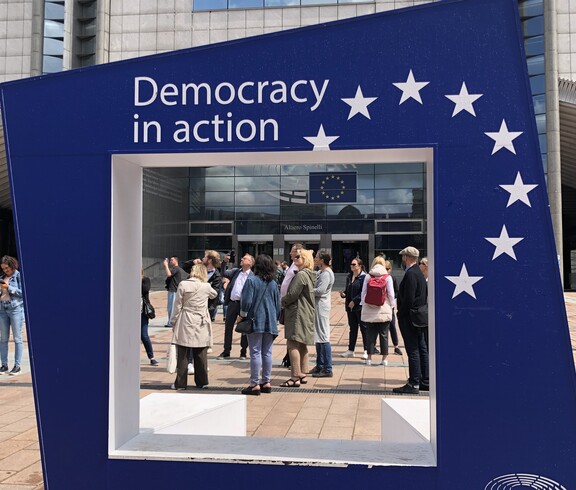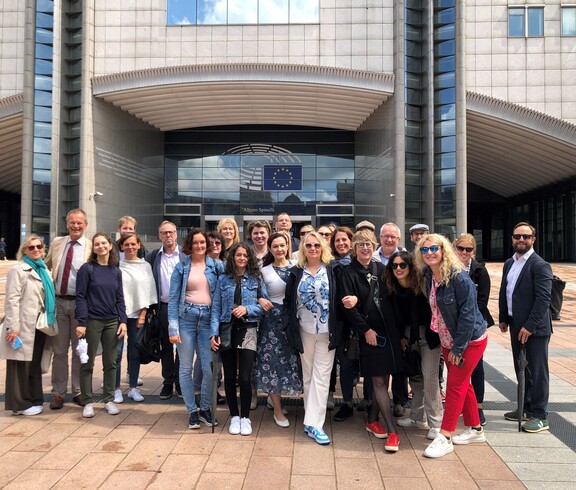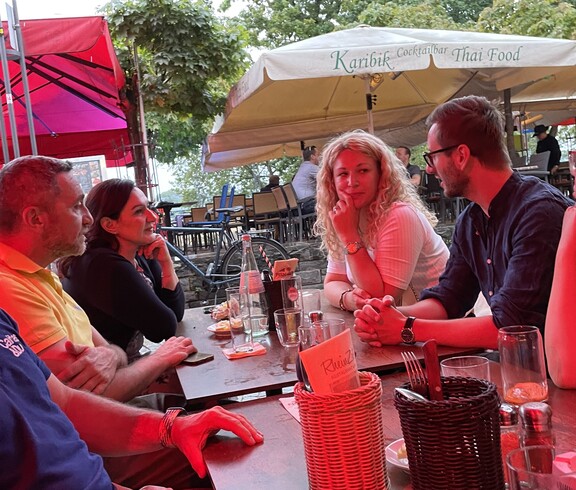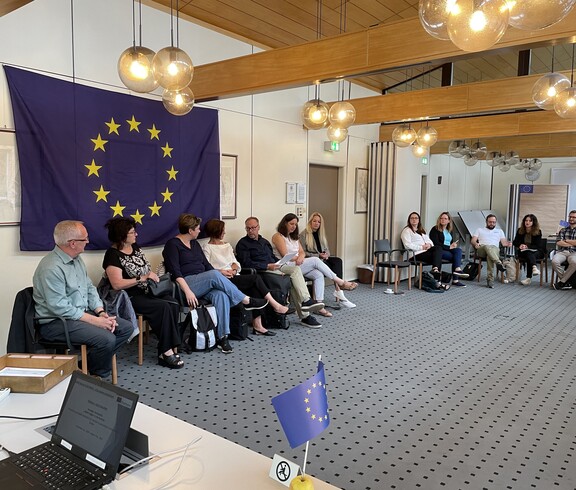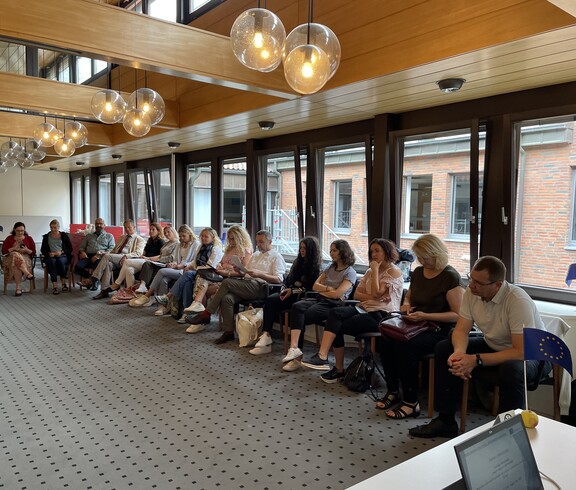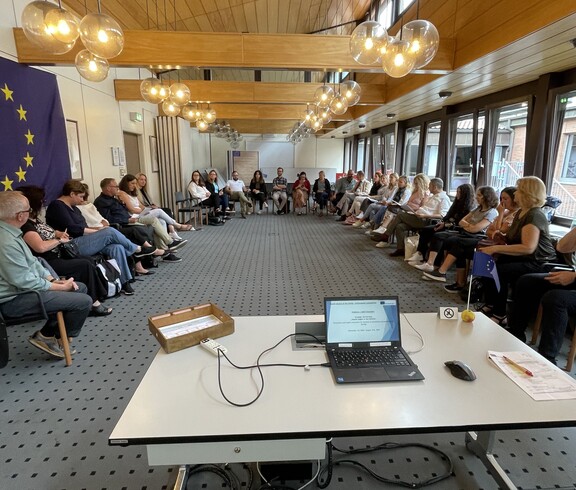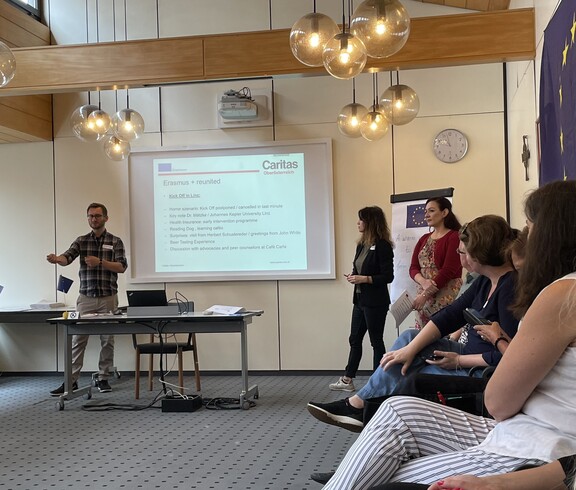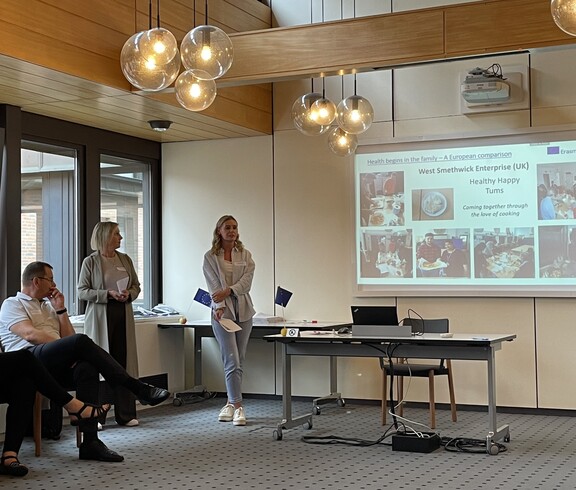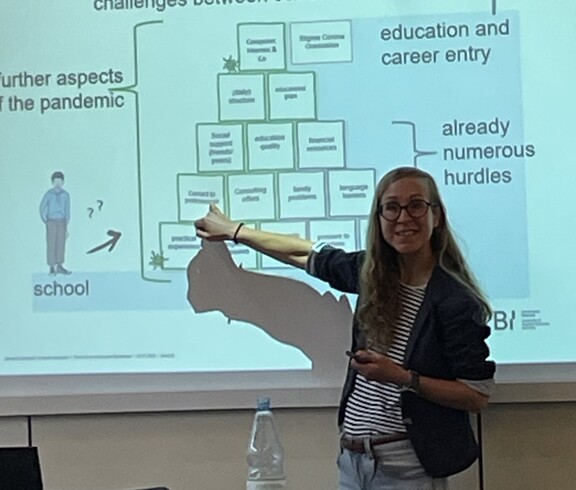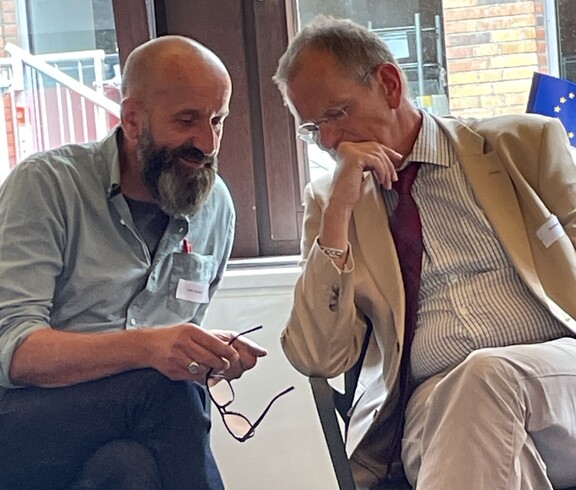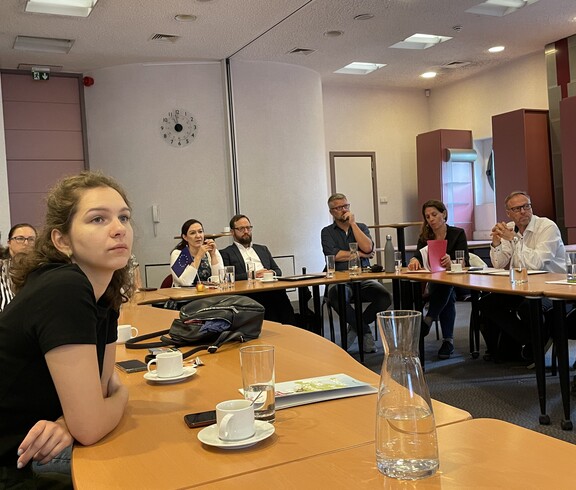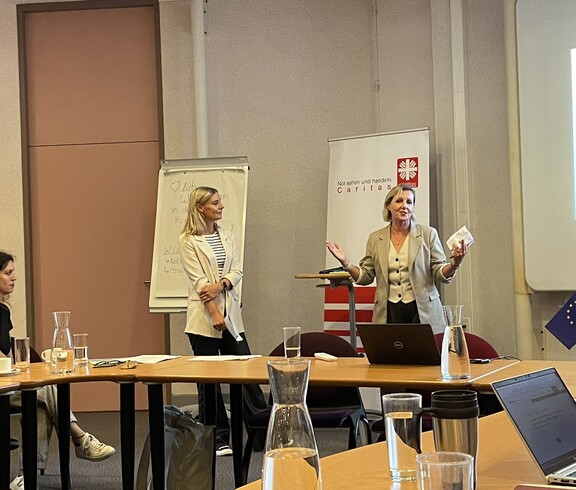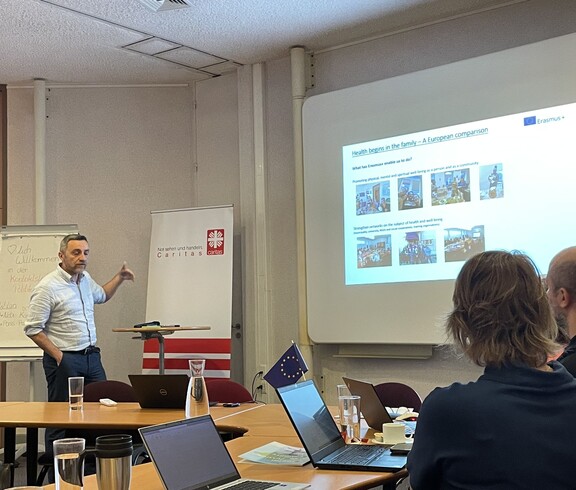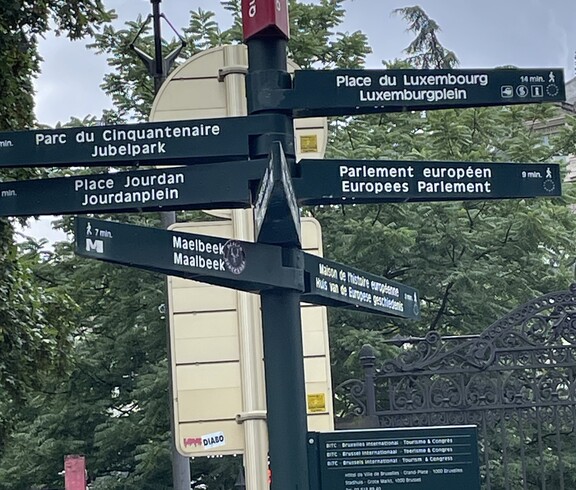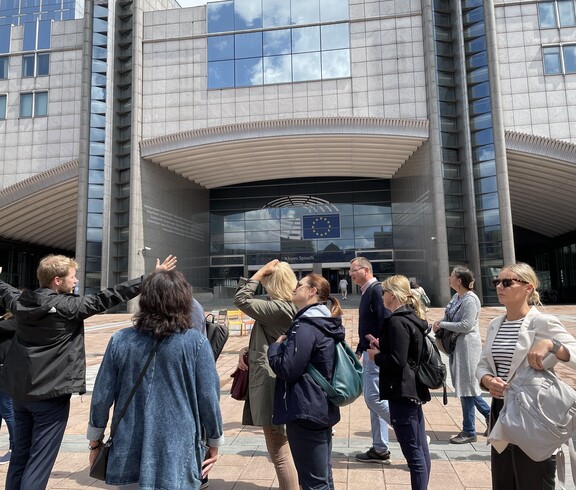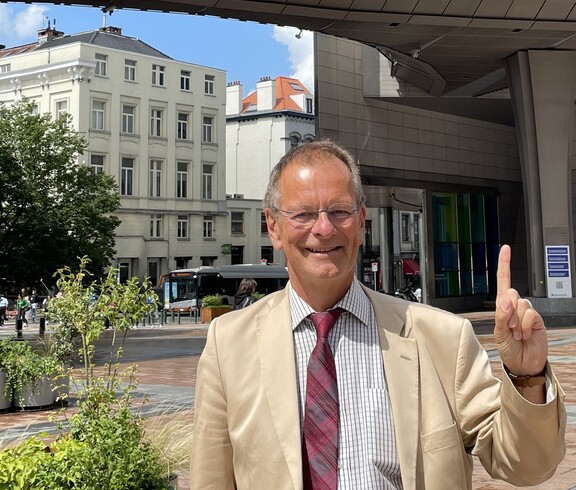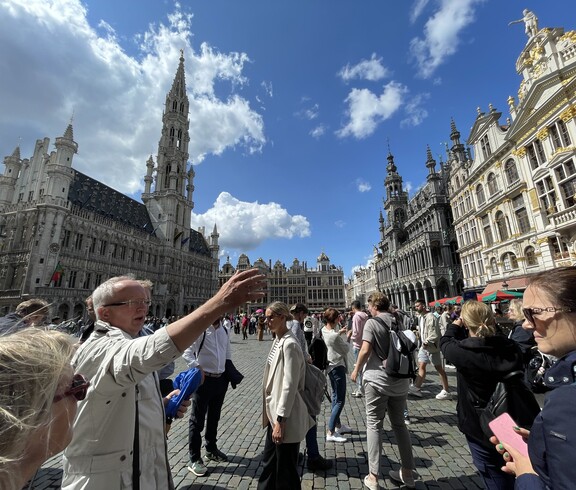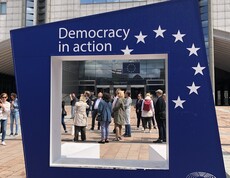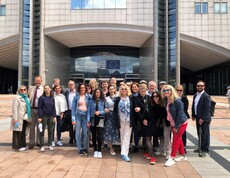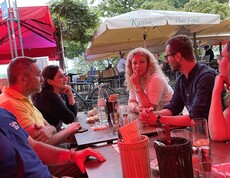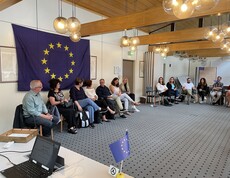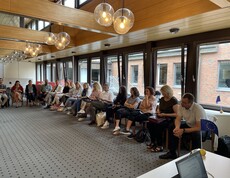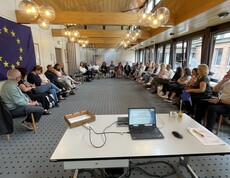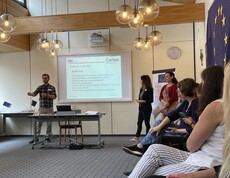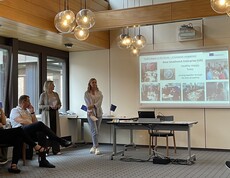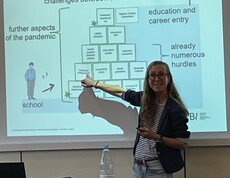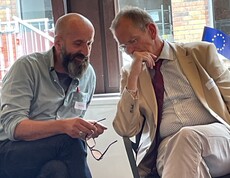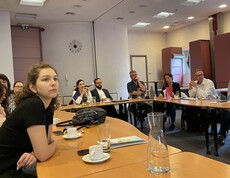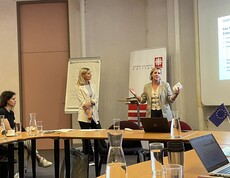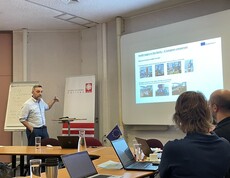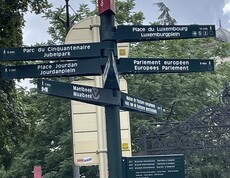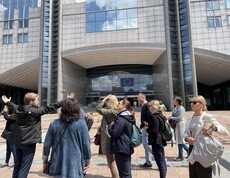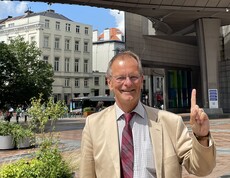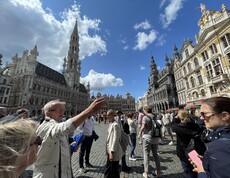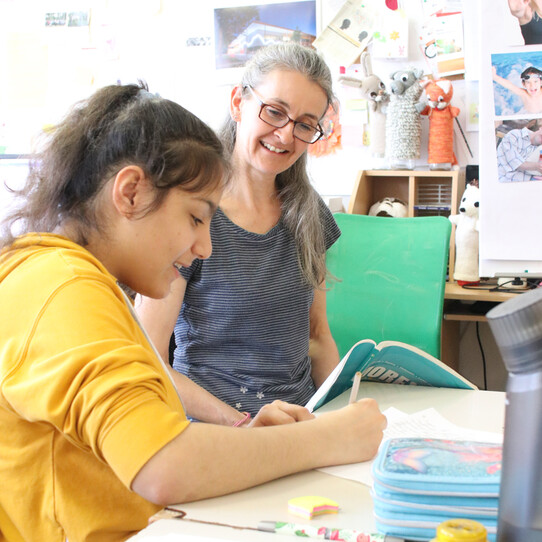Meeting Cologne (Germany)
24.-26. July 2023
Reports and Presentations
4th partnership meeting in Cologne (Germany)
The fourth meeting of the partnership "Health begins in the families - Prevention and health promotion for families in precarious circumstances in Europe" was also the final meeting. A total of 28 professionals from seven partner organisations took part. Other professionals also came to report on their work as speakers. The meeting took place from 24 to 26 July 2023 (arrival on 23 July) in Cologne (Germany) and was hosted by the project coordinator Diözesan-Caritasverband für das Erzbistum Köln.
The workshop started with a welcome by Heinz Blome, Head of Social Integration at the Diözesan-Caritasverband Köln. On behalf of the management, he welcomed the European guests and emphasised the close networking and good cooperation between the Erasmus+ partners. He also explained the tasks of the Diocesan Caritas Association with regard to counselling and assistance for disadvantaged people, especially for families and their children.
Ulrich Förster, coordinator of the Erasmus+ project, then presented the agenda for the next three days and moderated a round of introductions, as some new participants were present. Especially for new participants in the project group, he gave a short overview of the goals of the project and the course of the joint project work so far in order to create a common information base in the group. Afterwards, the individual project partners presented the main project activities, highlights and findings of the last 34 months.
In the afternoon, Prof. Dr. Anna Lena Rademaker, lecturer at the Bielefeld University of Applied Sciences, explained her approach of a lifeworld-oriented health promotion of disadvantaged families. She particularly emphasised the "setting-oriented" and participatory approach to counteract inequalities in health promotion and prevention. After her lecture, she presented different practical exercises that can be used in the work with disadvantaged families and their children. She provided all participants with the presentation and a comprehensive handout in English. This gives them the opportunity to incorporate the technical content into the everyday counselling and education work of their local partners. The day ended with a one-hour guided tour of Cologne Cathedral and a joint dinner.
On the second day, the project group went to Brussels to present and discuss the project activities and findings of the EU Commission. We were guests at the office of the German Caritas Association. Ms Kozak, officer in the Erasmus+ department, and Mr Simi took part in the discussion and were very taken with the diversity of the activities and the transnational learning experiences. She was particularly impressed by the access to highly disadvantaged families and the impact of the social education and counselling work on children. She recommended that the project participants apply to the EU Commission next year as a best practice model.
In addition, Shannon Pfohman presented the work of Caritas Europa and Tobias Kutschka the tasks of the representation of the German Caritas Association in Brussels. This was followed by a tour of the "political" Brussels with the EU Parliament, the EU Commission and the European Council, before the tour ended at the "Grote Markt". The second day ended with a joint dinner in Cologne.
On the morning of the third day, we visited the "ZentralE" project of the Catholic association IN VIA in Cologne, which is financed by ESF Plus. The project provides extensive education and counselling for single parents and is carried out in cooperation with the municipality. The presentation focused on questions about the health and especially the psychosocial situation of the target group as well as the extensive workshops offered for information, counselling and stabilisation. Of particular interest were also the various offers for children to relieve the burden on single parents.
At the end of the morning, the partners again exchanged essential findings of the joint project work. In addition, topics for future cooperation were collected in small groups. What all partners have in common is the wish to stay in contact beyond the end of the project and to carry out further projects and activities together. The third day ended with a joint lunch and farewell.
4. Partnertreffen in Köln (Deutschland)
Das vierte Treffen der Partnerschaft „Health begins in the families - Prevention and health promotion for families in precarious circumstances in Europe“ war gleichzeitig das Abschlusstreffen. Es nahmen insgesamt 28 Fachkräfte von sieben Partnerorganisationen teil. Hinzu kamen weitere Fachkräfte, um als Referent*innen über ihre Arbeit zu berichten. Das Treffen fand vom 24. bis 26. Juli 2023 (Anreise am 23.07.) in Köln (Deutschland) statt und wurde vom Projektkoordinator Diözesan-Caritasverband für das Erzbistum Köln ausgerichtet.
Der Workshop startete mit der Begrüßung durch Heinz Blome, Leiter des Bereichs Soziale Integration beim Diözesan-Caritasverband Köln. Im Namen der Geschäftsleitung hieß er die europäischen Gäste willkommen und hob die enge Vernetzung und gute Kooperation zwischen den Erasmus+-Partnern hervor. Zudem erläuterte er die Aufgaben des Diözesan-Caritasverbandes im Hinblick auf die Beratung und Hilfe für benachteiligte Menschen, insbesondere für Familien und ihre Kinder.
Ulrich Förster, Koordinator des Erasmus+ Projekts, präsentierte im Anschluss die Agenda der kommenden drei Tage und moderierte eine Vorstellungsrunde, da einige neue Teilnehmende anwesend waren. Insbesondere für neue Teilnehmende in der Projektgruppe gab er einen kurzen Überblick über die Ziele des Projekts und den Verlauf der bisherigen gemeinsamen Projektarbeit, um in der Gruppe eine gemeinsame Informationsbasis zu schaffen. Im Anschluss daran präsentierten die einzelnen Projektpartner die wesentlichen Projektaktivitäten, Highlights und Erkenntnisse der letzten 34 Monate.
Am Nachmittag erläuterte Prof. Dr. Anna Lena Rademaker, Lehrende an der Hochschule Bielefeld, ihren Ansatz einer lebensweltorientierten Gesundheitsförderung benachteiligter Familien. Sie hob hier insbesondere den „Setting orientierten“ und partizipativen Ansatz hervor, um Ungleichheiten bei der Gesundheitsförderung und -prävention entgegenzuwirken. Im Anschluss an ihren Vortrag stellte sie unterschiedliche praktische Übungen vor, die in die Arbeit mit benachteiligten Familien und ihren Kindern einfließen können. Allen Teilnehmenden stellte sie die Präsentation und ein umfangreiches Handout in englischer Sprache zur Verfügung. So besteht die Möglichkeit, die fachlichen Inhalte in die alltägliche Beratungs- und Bildungsarbeit der Partner vor Ort einfließen zu lassen. Den Abschluss des Tages bildete eine einstündige Führung im Kölner Dom und ein gemeinsames Abendessen.
Am zweiten Tag fuhr die Projektgruppe nach Brüssel, um die Projektaktivitäten und Erkenntnisse der EU-Kommission vorzustellen und zu diskutieren. Wir waren im Büro des Deutschen Caritasverbandes zu Gast. Frau Kozak, Referentin in der Erasmus+ Abteilung, und Herr Simi nahmen am Gespräch teil und zeigten sich sehr angetan von der Vielfalt der Aktivitäten und den transnationalen Lernerfahrungen. Insbesondere beeindruckte sie der Zugang zu stark benachteiligten Familien und die Wirkung der sozialen Bildungs- und Beratungsarbeit auf Kinder. Sie empfahl den Projektbeteiligten, sich im nächsten Jahr als Best-Practice-Modell bei der EU-Kommission zu bewerben.
Zudem stellte Shannon Pfohman die Arbeit von Caritas Europa und Tobias Kutschka die Aufgaben der Vertretung des Deutschen Caritasverbandes in Brüssel dar. Anschließend erfolgte ein Rundgang durch das „politische“ Brüssel mit EU-Parlament, EU-Kommission und Europäischer Rat, ehe die Führung am „Grote Markt“ endete. Der zweite Tag schloss mit einem gemeinsamen Abendessen in Köln.
Am Vormittag des dritten Tages besuchten wir das aus Mitteln des ESF Plus finanzierte Projekt „ZentralE“ des katholischen Verbandes IN VIA in Köln. Das Projekt leistet eine umfangreiche Bildungs- und Beratungsarbeit für Alleinerziehende und wird u. a. in Kooperation mit der Kommune durchgeführt. Im Mittelpunkt der Präsentation standen Fragen zu gesundheitlichen, vor allem psychosozialen Situation der Zielgruppe sowie die umfangreichen Workshops, die zur Information, Beratung und Stabilisierung angeboten werden. Von besonderem Interesse waren auch die vielfältigen Angebote für Kinder, um die Alleinerziehenden zu entlasten.
Zum Abschluss des Vormittags tauschten sich die Partner nochmals zu wesentlichen Erkenntnissen der gemeinsamen Projektarbeit aus. Zudem würden in Kleingruppen Themen für eine zukünftige Kooperation gesammelt. Gemeinsam ist allen Partnern der Wunsch, über das Ende des Projekts hinaus in Kontakt zu bleiben und weitere Projekte und Aktivitäten gemeinsam durchzuführen.
Der dritte Tag endete mit einem gemeinsamen Mittagessen und der Verabschiedung.
A patra reuniune de parteneriat la Köln (Germania)
Cea de-a patra întâlnire a parteneriatului „Sănătatea începe în familie – Prevenirea și promovarea sănătății pentru familiile aflate în situații precare din Europa” a fost în același timp și cea finală. În total, au participat 28 de specialiști din șapte organizații partenere. Întâlnirea a avut loc între 24 și 26 iulie 2023 la Köln (Germania) și a fost găzduită de coordonatorul de proiect Diözesan-Caritasverband für das Erzbistum Köln.
Workshopul a început cu un cuvânt de bun venit din partea lui Heinz Blome, șeful departamentului de integrare socială din cadrul Diözesan-Caritasverband Köln. În numele conducerii, acesta le-a urat bun venit oaspeților și a subliniat relația strânsă și buna cooperare dintre partenerii Erasmus+. De asemenea, a explicat sarcinile Asociației Caritas Diocezane în ceea ce privește consilierea și asistența pentru persoanele defavorizate, în special pentru familiileși copiii acestora. Ulrich Förster, coordonatorul proiectului Erasmus+, a prezentat apoi programul pentru următoarele trei zile și a moderat o rundă de prezentări. Pentru noii participanți acesta a oferit o scurtă prezentare generală a obiectivelor proiectului și a desfășurării activitățilorcomune a proiectului până în prezent, pentru a crea o bază comună de informații în cadrul grupului.
După-amiază, Prof. Dr. Anna Lena Rademaker, lector la Universitatea de Științe Aplicate din Bielefeld, a explicat abordarea sa privind promovarea sănătății familiilor defavorizate orientată spre lumea vieții. Ea a subliniat în special abordarea „orientată spre cadru” și participativă pentru a contracara inegalitățile în promovarea și prevenirea sănătății. În urma prezentării sale, a prezentat diferite exerciții practice care pot fi utilizate în activitatea cu familiile defavorizate și cu copiii acestora. Ea a pus la dispoziția tuturor participanților prezentarea și un manual cuprinzător în limba engleză. Acest lucru le oferă acestora posibilitatea de a încorpora conținutul tehnic în activitatea zilnică de consiliere și educație a partenerilor lor locali. Ziua s-a încheiat cu un tur ghidat de o oră la Catedrala din Köln și cu o cină comună.
În cea de-a doua zi, grupul de proiect a mers la Bruxelles pentru a prezenta și a discuta activitățile proiectului și concluziile Comisiei Europene. Am fost oaspeți la biroul Asociației Caritas din Germania. Doamna Kozak, ofițer în cadrul departamentului Erasmus+ și domnul Simi au luat și ei parte la discuție,fiind fost foarte încântați de diversitatea activităților și de experiențele de învățare transnaționale. Aceasta a fost impresionată în special de accesul la
familiile foarte dezavantajate și de impactul pe care îl au asupra copiilor activitățile de educație socială și de consiliere. Ea a recomandat ca participanții la proiect să se adreseze Comisiei Europene anul viitor ca model de bune practici.În plus, Shannon Pfohman a prezentat activitatea Caritas Europa, iar Tobias Kutschka sarcinile reprezentanței Asociației Caritas din Germania la Bruxelles. A urmat o vizită „politică” al Bruxelles-ului: Parlamentul UE, Comisia UE și Consiliul European, înainte ca turul să se sfârșească la „Grote Markt”. Cea de-a doua zi s-a încheiat cu o cină comună la Köln.
În dimineața celei de-a treia zi, am vizitat proiectul „ZentralE” al asociației catolice IN VIA din Köln, care este finanțat de FSE Plus. Proiectul oferă educație și consiliere extensivă pentru părinții singuri și se desfășoară în cooperare cu municipalitatea. Prezentarea s-a axat pe întrebări despre sănătatea și mai ales situația psihosocială a grupului țintă precum și pe atelierele ample oferite pentru informare, consiliere și stabilizare. Un interes deosebit au fost și diferitele oferte pentru copii pentru a ușura povara părinților singuri.
La sfârșitul dimineții, partenerii au făcut din nou schimb de informații despre rezultatele esențiale ale activităților comune din cadrul proiectului. În plus, în grupuri mici au fost colectate teme pentru o viitoare cooperare. Ceea ce au în comun toți partenerii este dorința de a rămâne în contact și după încheierea proiectului, de a realiza împreună alte proiecte și activități. Cea de-a treia zi s-a încheiat cu un prânz comun și cu un rămas bun.
Projektzáró találkozó Kölnben
Az „Az egészség a családokban kezdődik – Megelőzés és egészségfejlesztés a bizonytalan körülmények között élő családok számára Európában” nevet viselő projekt negyedik, és egyben záró találkozóját Németországban tartották meg. Hét partnerszervezet összesen 28 szakembere vett részt az eseményen, melyre más szakértők is eljöttek, hogy előadóként beszámoljanak munkájukról. A rendezvényre 2023. július 24–26. között került sor, és a program koordinátora a kölni Diözesan-Caritasverband für das Erzbistum volt.
A workshopot Heinz Blome, a Diözesan-Caritasverband Köln társadalmi integrációért felelős vezetőjének köszöntője nyitotta meg. A vezetőség nevében üdvözölte az Európa különböző szögleteiből érkező vendégeket, és kiemelte az Erasmus+ partnerek közötti szoros hálózatépítést és jó együttműködést. Emellett bemutatta az Egyházmegyei Caritas Szövetség feladatait, a hátrányos helyzetű személyek, illetve a családok és gyermekeik tanácsadásával és segítésével kapcsolatban.
Ulrich Förster, az Erasmus+ projekt koordinátora ezután ismertette a következő három nap programját, majd moderálta a bemutatkozási kört, mivel néhány új résztvevője is volt az értekezletnek. Különösen az új résztvevőknek adott egy rövid áttekintést a projekt céljairól és a közös projekt eddigi menetéről, azzal a céllal, hogy kollektív információs alapot hozzanak létre a csoportban. Ezután az egyes partnerek ismertették a projekt fő tevékenységeit, kiemelve az elmúlt a projekt kezdete óta eltelt 34 hónap főbb eredményeit.
Délután prof. dr. Anna Lena Rademaker, a Bielefeldi Alkalmazott Tudományok Egyetemének előadója ismertette a hátrányos helyzetű családok élettapasztalatokra összpontosító egészségfejlesztési megközelítését. Kiemelte a „környezetorientált” és részvételi megközelítést azzal a céllal, hogy ellensúlyozza az egészségfejlesztés és megelőzés terén tapasztalható egyenlőtlenségeket. Előadása után különböző gyakorlati helyzeteket vagy jó gyakorlatokat mutatott be, amelyeket a hátrányos helyzetű családokkal és gyermekeikkel folytatott munka során lehet alkalmazni. Minden résztvevőnek angol nyelven átadta az előadás anyagát és egy átfogó kézikönyvet. Ez lehetőséget ad nekik arra, hogy a szakmai tartalmat beépítsék a helyi partnerek mindennapi tanácsadási és oktatási munkájába. A napot a kölni dómban tartott látogatás és közös vacsora zárta.
A második napon a csoport Brüsszelbe utazott, hogy bemutassa és megvitassa az EU Bizottsággal a projekt tevékenységeit és az eredményeit. Ezen kívül a Német Caritas-szövetség irodájában is vendégeskedtek. Kozak asszony, az Erasmus+ osztály tisztviselője és Simi úr részt vett a megbeszélésen, és nagyon lelkesek voltak a tevékenységek sokféleségét és az országközi tanulási kapcsolódás, a szociális oktatás és tanácsadás munkájának hatása a gyermekekre. Javasolta, hogy a workshop résztvevői jövőre pályázzanak a projektükkel az EU Bizottságnál.
Ezen kívül Shannon Pfohman ismertette a Caritas Europa munkáját, míg Tobias Kutschka a Német Caritas-szövetség brüsszeli képviseletének feladatairól beszélt. Ezt követtőn Brüsszel „politikai” túráján vettünk részt, érintve az EU Parlamentet, az EU Bizottságot és az Európai Tanácsot, mielőtt a séta a Grote Markt nevű téren ért véget. A második napot közös vacsora zárta Kölnben.
A harmadik nap reggelén meglátogattuk az IN VIA katolikus egyesület ZentralE projektjét Kölnben, amelyet az ESZA Plus finanszíroz. A projekt széles körű oktatást és tanácsadást nyújt egyedülálló szülőknek, és az önkormányzattal együttműködve valósul meg. Az előadás a célcsoport egészségügyi és különösen pszichoszociális helyzetével kapcsolatos kérdésekre, valamint a tájékoztatás, tanácsadás és stabilizáció céljából kínált széles körű műhelymunkákra összpontosított. Különösen érdekesek voltak a gyermekekre vonatkozó különféle ajánlatok is, amelyek az egyedülálló szülők terheit könnyítik meg.
A délelőtt a partnerek újabb eszmecseréjével és a közös projektmunka eredményeinek ismertetésével ért véget, emellett összegyűjtötték a jövőbeni együttműködés témáit, feladatait. Minden partnerben közös volt az a szándék, hogy a program végén is kapcsolatban maradjanak, és további projekteket valamint tevékenységeket valósítsanak meg közösen. A harmadik nap újabb közös étkezéssel, majd búcsúval zárult.
4-asis partnerystės susitikimas Kelne (Vokietija)
Ketvirtasis ir baigiamasis partnerystės projekto "Sveikata prasideda šeimose - prevencija ir sveikatos stiprinimas šeimoms, patiriančioms sunkumus ir rizikas Europoje" susitikimas. Jame iš viso dalyvavo 28 specialistai iš septynių partnerių organizacijų. Kiti specialistai taip pat atvyko į susitikimą ir dalyvavo jame kaip pranešėjai, papasakojo apie savo darbą. Su-sitikimas vyko 2023 m. liepos 24-26 d. (atvykimas liepos 23 d.) Kelne (Vokietija), jį surengė projekto koordinatorius Diözesan-Caritasverband für das Erzbistum Köln.
Seminaras prasidėjo Diözesan-Caritasverband Köln Socialinės integracijos skyriaus vadovo Heinzo Blome sveikinimo žodžiu. Vadovybės vardu jis pasveikino svečius iš Europos ir pab-rėžė, kad "Erasmus+" partneriai glaudžiai bendrauja ir gerai bendradarbiauja. Jis taip pat pa-pasakojo apie vyskupijos Caritas draugijos uždavinius, susijusius su konsultavimu ir pagalba socialiai remtiniems žmonėms, ypač šeimoms ir jų vaikams.
Po to "Erasmus+" projekto koordinatorius Ulrichas Försteris pristatė kitų trijų dienų darbot-varkę ir moderavo prisistatymų raundą, nes atvyko keletas naujų dalyvių. Naujiems projekto grupės dalyviams jis trumpai apžvelgė projekto tikslus ir ligšiolinio bendro projektinio darbo eigą, kad grupėje būtų sukurta bendra informacijos bazė.
Vėliau atskiri projekto partneriai pristatė pagrindines projekto veiklas, svarbiausius dalykus ir pastarųjų 34 mėnesių rezultatus.
Po pietų Bielefeldo taikomųjų mokslų universiteto dėstytoja Prof. Dr. Anna Lena Rademaker papasakojo apie savo požiūrį į gyventojų pasaulį orientuotą socialiai remtinų šeimų sveikatos stiprinimą. Ji ypač pabrėžė "į aplinką orientuotą" ir dalyvaujamąjį požiūrį, kuriuo siekiama ko-voti su nelygybe sveikatos stiprinimo ir prevencijos srityje. Po pranešimo ji pristatė įvairias praktines užduotis, kurias galima naudoti dirbant su socialiai remtinomis šeimomis ir jų vaikais. Visiems dalyviams ji pateikė prezentaciją ir išsamią dalijamąją medžiagą anglų kalba. Tai suteikia dalyviams galimybę įtraukti techninį turinį į kasdienį savo vietos partnerių
konsultavimo ir švietimo darbą. Diena baigėsi valandos trukmės ekskursija po Kelno katedrą ir bendra vakariene.
Antrąją dieną projekto grupė išvyko į Briuselį pristatyti ir aptarti projekto veiklos ir išvadų ES Komisijoje. Svečiavomės Vokietijos Caritas asociacijos biure. Diskusijoje dalyvavo "Eras-mus+" skyriaus pareigūnė p. Kozak ir p. Simi, kurie buvo labai sužavėti veiklos įvairove ir tarptautine mokymosi patirtimi. Jai ypač didelį įspūdį paliko galimybė patekti į labai nepa-lankioje padėtyje esančias šeimas ir socialinio ugdymo bei konsultuojamojo darbo poveikis vaikams. Ji rekomendavo projekto dalyviams kitais metais teikti paraišką ES Komisijai kaip gerosios praktikos modeliui.
Be to, Shannon Pfohman pristatė Caritas Europa veiklą, o Tobias Kutschka - Vokietijos Cari-tas asociacijos atstovybės Briuselyje užduotis. Po to sekė ekskursija po "politinį" Briuselį su ES Parlamento, ES Komisijos ir Europos Vadovų Tarybos atstovais, o ekskursija baigėsi "Grote Markt". Antroji diena baigėsi bendra vakariene Kelne.
Trečiosios dienos rytą aplankėme katalikiškos asociacijos IN VIA projektą "ZentralE" Kelne, finansuojamą ESF plius lėšomis. Šis projektas teikia platų švietimą ir konsultacijas vi-enišiems tėvams ir yra vykdomas bendradarbiaujant su savivaldybe. Pristatyme daugiausia dėmesio skirta klausimams apie tikslinės grupės sveikatos, ypač psichosocialinės, padėtį, taip pat apie siūlomus išsamius informavimo, konsultavimo ir stabilizavimo seminarus. Ypa-tingo susidomėjimo sulaukė ir įvairūs pasiūlymai vaikams, siekiant palengvinti vienišiems tėvams tenkančią naštą.
Rytmečio pabaigoje partneriai dar kartą pasikeitė esminėmis bendro projektinio darbo išvadomis. Be to, mažose grupelėse buvo renkamos temos tolimesniam bendradarbiavimui. Visus partnerius vienija noras palaikyti ryšius ir pasibaigus projektui bei kartu vykdyti toli-mesnius projektus bei tęsti veiklą. Trečioji diena baigėsi bendrais pietumis ir atsisveikinimu.
4° incontro di partenariato a Colonia (Germania)
Il quarto incontro del partenariato "La salute inizia in famiglia - Prevenzione e promozione della salute per le famiglie in condizioni precarie in Europa" è stato anche l'incontro finale. Vi hanno partecipato 28 professionisti di sette organizzazioni partner. Altri professionisti sono intervenuti come relatori per raccontare il loro lavoro. L'incontro si è svolto dal 24 al 26 luglio 2023 (arrivo il 23 luglio) a Colonia (Germania) ed è stato ospitato dal coordinatore del pro-getto Diözesan-Caritasverband für das Erzbistum Köln.
Il workshop è iniziato con il benvenuto di Heinz Blome, responsabile dell'integrazione sociale della Diözesan-Caritasverband Köln. A nome della direzione, ha dato il benvenuto agli ospiti europei e ha sottolineato la solida rete e la buona collaborazione tra i partner Erasmus+. Ha inoltre illustrato i compiti della Diözesan-Caritasverband Köln in materia di consulenza e assi-stenza alle persone svantaggiate, in particolare alle famiglie e ai loro figli.
Ulrich Förster, coordinatore del progetto Erasmus+, ha poi presentato l'agenda dei tre giorni successivi e ha moderato un giro di presentazioni, dato che erano presenti alcuni nuovi par-tecipanti. Soprattutto per i nuovi, ha fornito una breve panoramica degli obiettivi del progetto e del lavoro congiunto svolto, al fine di creare una base di informazioni comune nel gruppo.
Successivamente, i singoli partner del progetto hanno presentato le principali attività, i punti salienti e i risultati degli ultimi 34 mesi.
Nel pomeriggio, la prof.ssa Anna Lena Rademaker, docente presso l'Università di Scienze Applicate di Bielefeld, ha illustrato il suo approccio di promozione della salute delle famiglie svantaggiate. Ha sottolineato in particolare l'approccio "orientato al setting" e partecipativo per contrastare le disuguaglianze nella promozione della salute e nella prevenzione. Dopo la presentazione, ha illustrato diversi esercizi pratici che possono essere utilizzati nel lavoro con le famiglie svantaggiate e i loro bambini. Ha fornito a tutti i partecipanti la presentazione e una dispensa completa in inglese. In questo modo hanno avuto l'opportunità di incorporare i contenuti tecnici nel lavoro quotidiano di consulenza ed educazione dei loro partner locali.
La giornata si è conclusa con una visita guidata di un'ora alla Cattedrale di Colonia e una cena comune.
Il secondo giorno, il gruppo di progetto si è recato a Bruxelles per presentare e discutere le attività e i risultati del progetto alla Commissione Europea. Siamo stati ospiti dell'ufficio dell'Associazione Caritas tedesca. La signora Kozak, funzionario del dipartimento Erasmus+, e il signor Simi hanno partecipato alla discussione e sono rimasti molto colpiti dalla diversità delle attività e dalle esperienze di apprendimento transnazionali. È rimasta particolarmente colpita dall'accesso a famiglie altamente svantaggiate e dall'impatto del lavoro di educazione sociale e consulenza sui bambini. Ha raccomandato ai partecipanti al progetto di presentare l'anno prossimo una domanda alla Commissione Europea come modello di buone pratiche.
Inoltre, Shannon Pfohman ha presentato il lavoro di Caritas Europa e Tobias Kutschka i compiti della rappresentanza dell'Associazione Caritas tedesca a Bruxelles. È seguita una visita alla Bruxelles "politica" con il Parlamento europeo, la Commissione europea e il Consi-glio europeo, prima che la visita si concludesse al "Grote Markt". Il secondo giorno si è con-cluso con una cena comune a Colonia.
La mattina del terzo giorno abbiamo visitato il progetto "ZentralE" dell'associazione cattolica IN VIA di Colonia, finanziato da ESF Plus. Il progetto fornisce un'ampia formazione e consu-lenza ai genitori single ed è realizzato in collaborazione con il Comune. La presentazione si è concentrata su questioni relative alla salute e soprattutto alla situazione psicosociale del gruppo target, nonché sui numerosi laboratori offerti per l'informazione, la consulenza e la stabilizzazione. Di particolare interesse sono state anche le varie offerte per i bambini, per alleviare il peso dei genitori single.
Alla fine della mattinata, i partner si sono scambiati nuovamente i risultati essenziali del la-voro congiunto del progetto. Inoltre, in piccoli gruppi sono stati raccolti argomenti per la coo-perazione futura. Ciò che accomuna tutti i partner è il desiderio di rimanere in contatto anche dopo la fine del progetto e di realizzare insieme ulteriori progetti e attività. Il terzo giorno si è concluso con un pranzo comune e un saluto.
E-Book
Click here for the e-book:
https://cloud.3dissue.com/183/378/716/strategic-partnership/index.html?r=84
A short video with statements from responsible colleagues about our project work in Erasmus+ was recorded in Brussels.
Report on the final workshop at the EU Platform for Adult Learning EPALE:
https://epale.ec.europa.eu/de/blog/health-begins-family-abschluss-koeln-und-bruessel
Documents
-
Health begins in the family – A European comparison
pdf, 480 KB -
Health begins in the family – A European comparison
pdf, 1 MB -
Health begins in the family – A European comparison
pdf, 2 MB -
Health begins in the family – A European comparison
pdf, 437 KB -
Health begins in the family – A European comparison
pdf, 1 MB -
Health begins in the family – A European comparison
pdf, 1 MB -
Health begins in the family – A European comparison
pdf, 621 KB -
08_Rademaker_Handouts_Workshop_Caritas.pdf
pdf, 2 MB
